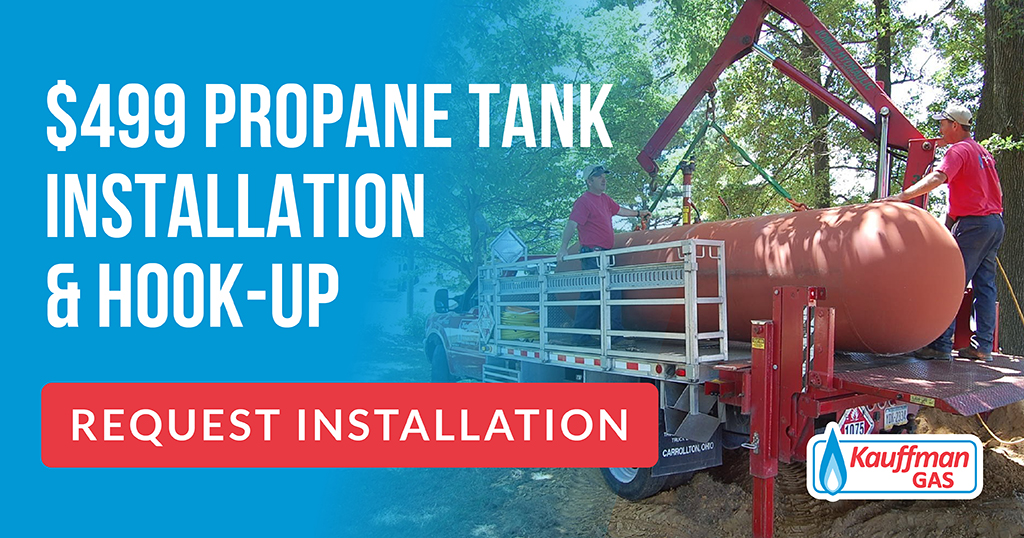Many furnaces and other appliances use either natural gas or propane as fuel. Natural gas is found underground and it contains a variety of gases, including propane, butane, and methane. Natural gas can be an uncompressed or compressed gas or it can come in liquid form.
Propane, also referred to as liquefied petroleum gas or LPG, is stored as a liquid. A processing facility separates propane from natural gas before it makes its way to the home.
Before you decide which fuel source is going to best for your home, it’s important to understand the differences in terms of propane vs gas. This includes understanding how they differ in safety, compositions, efficiency, delivery methods, and installation techniques.
1. Installation
Many appliances are able to run on either natural gas or propane. However, each fuel source is going to require special gas utilization fittings. If you want to switch from one fuel source to another, you’ll have to use a conversion kit.
Natural gas is a utility that’s only available in some areas. It comes to your home via underground pipes. Your local utility company will likely own the outdoor pipes that carry natural gas.
Propane, on the other hand, is stored in tanks and needs to be periodically refilled or replaced.
Some tanks are portable and small while others can be several feet long. You can even have a bigger tank placed in your yard or buried underground.
2. Storage and Delivery
Propane can be used pretty much anywhere. This makes it an ideal fuel source for people who live in remote areas or places that don’t have natural gas pipelines. However, you’re going to have to wait for your tank to be refilled.
This means that you need to make sure you have enough fuel to get you through emergencies in case you run out before your next refill. Natural gas, on the other hand, is always available because it comes to your home via pipes.
Unfortunately, if there’s a leak in your natural gas pipe, your utility bill could go up immensely. This is different than if a propane tank were to leak, in which case only one tank would be affected.
When stored in a tank, propane takes the form of a liquid. It turns into a gas when it’s released through a valve on your tank. Natural gas can take the form of compressed or uncompressed gas or as a liquid.
3. Efficiency and Cost
Propane tends to be more expensive than natural gas. However, the same amount of propane is able to produce about twice as much heat as natural gas. Natural gas is measured in cubic feet while propane is measured in gallons.
Professionals measure the heat from both types of fuel in BTUs (British Thermal Units).
Depending on where you live, natural gas or propane might make more financial sense. Both of these fuel sources tend to be less expensive and more efficient than electricity.
It will likely cost you more to get a new natural gas line installed than get a propane tank added to your house. However, natural gas might help you reduce your utility bills over time.
It can be useful to also consider which kinds of appliances are already in your house.
4. Chemical Makeup
Propane is going to be the cleanest burning fossil fuel at your disposal. It produces around half the amount of carbon dioxide as gasoline. It also won’t harm soil or water.
Natural gas is mostly composed of methane. Methane is a greenhouse gas that’s more than eighty times more powerful than carbon dioxide. Thankfully, natural gas also burns cleaner than many other fossil fuels.
This means that pollutants produced by natural gas usually only make their way into the atmosphere after being accidentally leaked. Methane turns into carbon dioxide after spending several years in the air.
Because most electricity today is produced by coal plants, natural gas and propane are both more environmentally friendly than electricity in many cases.
5. Safety
Propane and natural gas are both odorless and colorless. In order to help people find leaks, manufacturers add a harmless chemical called mercaptan. This chemical smells like sulfur or rotten eggs which makes it easy to detect.
If you notice a strange smell in your house, put out any flames and go outside. Once your away from your home, call 911. You shouldn’t plug in or unplug any devices or turn on any electronics.
You could end up causing a spark that could lead to an explosion. Because leaks can also happen in underground pipes, you should leave the area if you smell sulfur outside.
If you have a propane leak, you want to turn the gas supply off at the tank. Because propane needs to be cold to stay in its liquid form, most tanks are white in order to reflect heat. If a container becomes too hot, a safety valve will open in order to let out pressure and stop an explosion from happening.
Propane can also cause frostbite if it makes contact with your skin, so you should never touch it.
The Importance of Knowing the Difference Between Propane vs Natural Gas
As we can see, there are several differences between propane vs natural gas. While natural gas might be useful for people who already have the right piping, propane can be a convenient and efficient fuel source for most homeowners.
Are you looking for fast and affordable propane delivery? If you are, then contact us today and see what we can do for you!

